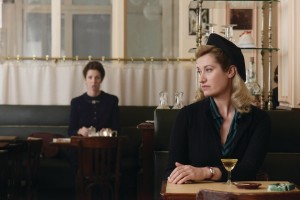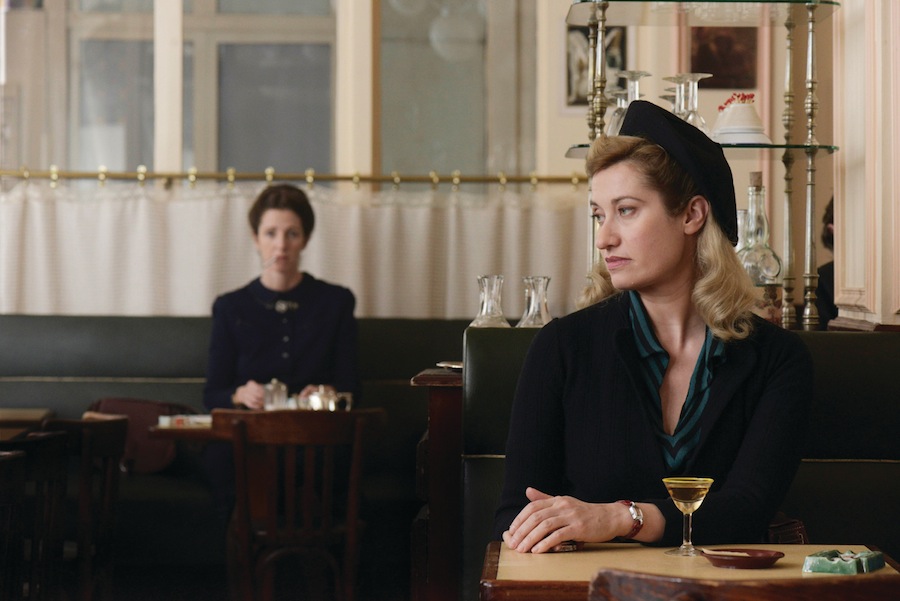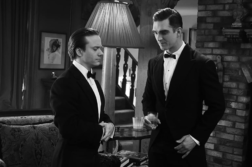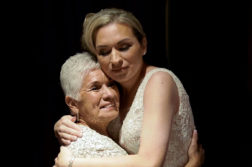 Violette. A film by Martin Provost
Violette. A film by Martin Provost
YOU HAVE TO HAND IT to the French for making a biopic about a writer known in the U.S., if at all, only in academic and feminist circles. Violette is an examination of the ravaged emotional and romantic life of a deeply personal writer who found her greatest supporter in the far more famous Simon de Beauvoir.
Martin Provost’s film is a steadily absorbing account of an insecure woman coming of age in Nazi-occupied France, struggling to find her emotional balance and her voice, feeling ugly and unloved, who drove her friends to distraction and her small circle of literary companions and mentors nearly to despair. Born out of wedlock, Violette’s relations to her mother were constantly fraught, and during the harsh wartime and its aftermath, she relied on the black market to earn a living and acquire what few creature comforts—especially food—sustained her.
Spurred to her earliest literary efforts by the homosexual writer Maurice Sachs, an ethically suspect character rumored to have collaborated with the Nazis, she finds the wherewithal to deliver her first book-length manuscript, anonymously, to the door of Simone de Beauvoir, already a known literary figure. “Castor”—as Jean-Paul Sartre called de Beauvoir, his longtime companion—immediately recognizes a unique voice in Leduc and helps get her first book published with the prestigious Gallimard house.
Provost and his co-screenwriters have chosen a literary format to tell their story. The film proceeds in a series of chapters, each named for a character who enters Violette’s life as she struggles to gain recognition in an already crowded postwar literary field. Fortunately, despite her alternately aggressive and defensive behavior, she is introduced to literary notables like the former convict Jean Genet, himself championed by Jean-Paul Sartre, and the wealthy manuscript collector Jacques Guérin, heir to the Parfums d’Orsay fortune. Aware of her shame as illegitimate, the two men proudly proclaim their similar bastard status, turning it into an emblem of defiance. Yet Violette is slow to understand that Guérin’s homosexuality disqualifies him as a suitable love interest. Perhaps she allows for the possibility because her own sexual identity is rather more fluid. While her essential interest seems to be in women, she has had a youthful marriage and an abortion, and earlier she pined for Maurice Sachs’ attentions despite his unreliability.
However, Violette—the socially awkward “ugly duckling”—misconstrues Simone de Beauvoir’s professional and sympathetic counsel, becoming jealous and obsessive toward the older writer. De Beauvoir, at once deeply intellectual and worldly, negotiates her acolyte’s emotional demands with steely skill. Indeed, the push-and-pull between the two women is a mother-daughter conflict on a high plane, the only difference being the erotic undercurrent on Violette’s side.
In the end, the film concentrates on the power differential between the operatically emotional Violette, whose writing, we come to understand, is an angry cri de coeur, and the coolly rational de Beauvoir. As Violette, Emmanuelle Devos gives a courageous performance, daring us to find her as annoying as some of her friends do. But her “bad” behavior is revealed as so much the product of emotional and psychic deprivation that we root for her in spite of ourselves. Sandrine Kiberlain plays de Beauvoir with appropriate sang-froid as he career leaps ever higher toward her groundbreaking The Second Sex, a feminist manifesto hardly appreciated by her male counterparts in the phallocratic postwar world of Parisian letters. Violette’s sexual jealousy of Simone mixes with professional envy—something we’ve already witnessed at a rehearsal of her friend Genet’s The Maids—yet de Beauvoir forces Leduc to reckon with her demons through writing books of piercing honesty.
Leduc was possibly the first French woman to describe her sexual awakening with another girl at school, or to detail adult sexual experience of the kind that only men could traditionally write about. At de Beauvoir’s urging, Leduc makes public her past abortion at a time when the procedure was still illegal in France. The story moves toward Leduc’s first great public success after more than a decade of struggle. La Bâtarde (The Bastard) made her popular, it would seem, not despite but because of its unflinching emotionality and nakedness.
Violette is as much a film about the loneliness of the long-distance artist as it is an examination of a woman’s frantic quest to speak her own truth in her own voice. To peg it as a feminist or lesbian film because its themes so manifestly speak to those issues would be to miss another point: that to be an artist is often equivalent to being an outsider in one’s own homeland.






